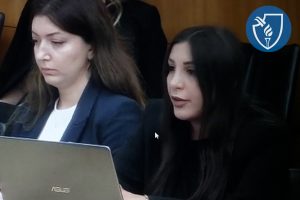The 29th Steering Group Meeting of the Istanbul Anti-Corruption Action Program of the OECD Anti-Corruption Network for Eastern Europe and Central Asia is currently taking place in Paris, France. The meeting is attended by officials from various countries and representatives of civil society organizations.
The meeting is also attended by Mariam Zadoyan, a representative of the Armenian Lawyers’ Association and an anti-corruption expert with the CSO Anti-Corruption Coalition of Armenia. In her speech, she addressed the assessments given to Armenia and Azerbaijan by the Istanbul Anti-Corruption Action Program of the OECD Anti-Corruption Network for Eastern Europe and Central Asia, highlighting methodological and institutional issues.
Here is Mariam Zadoyan’s speech below.
Good afternoon, everyone.
My name is Mariam Zadoyan, and I represent the Armenian Lawyers’ Association. Our organization coordinates the Secretariat of the CSO Anti-Corruption Coalition of Armenia, which unites around 50 organizations across Armenia working in the anti-corruption sector.
First and foremost, I would like to express my gratitude for the opportunity to share our experiences during the 29th ACN Steering Group Meeting. I look forward to contributing to the discussion on how non-governmental stakeholders can engage in anti-corruption agenda-setting, particularly in strategy development and implementation, as well as in monitoring efforts that enhance accountability and deliver tangible results from the Armenian perspective.
Allow me to outline some key steps in our journey. Armenia recently concluded its 4th Anti-Corruption Strategy. We recommended that the Government establish a working group in collaboration with specialized CSOs to develop the new, 5th Anticorruption strategy. This recommendation was adopted, and as a result, an ad-hoc Working Group, comprising state bodies, specialized CSOs, and experts, was formed by decree of the Minister of Justice, ensuring a broad and participatory process.
After several months of intensive collaboration, Armenia now has a quite ambitious and inclusive strategy, developed through a productive process with strategic outcomes, and with most of our recommendations—particularly those with institutional significance—being adopted. I would like to emphasize that many of our suggestions, developed under the EUforIntegrity initiative’s Open Government Grants, were derived from international best practices, including OECD standards under the 5th Round of Monitoring of the ACN Istanbul Anti-Corruption Action Plan, focusing on areas such as whistleblower protection, conflict of interest, and business integrity.
Currently, we are actively supporting the implementation of this strategy by providing expert input and conducting annual public monitoring of its progress based on an inclusive methodology including focus group discussions with key stakeholders. This approach allows the government to receive an alternative evaluation of the strategy from civil society and public perspectives, using both quantitative and qualitative indicators, and to take into consideration the challenges and recommendations highlighted through the monitoring process.
Despite the success of this participatory approach, Armenia has received a lower score than some other countries in the Anti-Corruption Policy performance area under the ACN 5th Round of Monitoring. While we recognize that the ACN Istanbul Anti-Corruption Action Plan does not directly compare countries, we have identified inconsistencies in the application of the methodology, for example in case of Azerbaijan. This issue extends beyond anti-corruption policy to other areas, such as judicial independence. Specifically, the weight given to NGO contributions in determining final scores appears to vary across countries.
Therefore, taking this opportunity, we kindly recommend a thorough review of the ACN methodology to ensure a more consistent approach. Namely, in cases where NGOs are unable to contribute for a particular performance area, we believe this should be treated as a red flag and appropriately reflected in the final score.
In light of these observations, thank you for your attention, and we look forward to further discussions on this critical topic.
In response to the question raised by Mariam Zadoyan regarding the methodology for evaluating countries, the representative of the Istanbul Anti-Corruption Action Program of the OECD Anti-Corruption Network for Eastern Europe and Central Asia replied that the issue will be discussed during today’s meeting.
>We would like to remind you that the Coalition of Armenian CSOs against Corruption has expressed concern regarding the assessment given by the Istanbul Anti-Corruption Action Program of the OECD Anti-Corruption Network for Eastern Europe and Central Asia on anti-corruption reforms in Azerbaijan and, in this regard, issued a statement on May 8, 2024.















